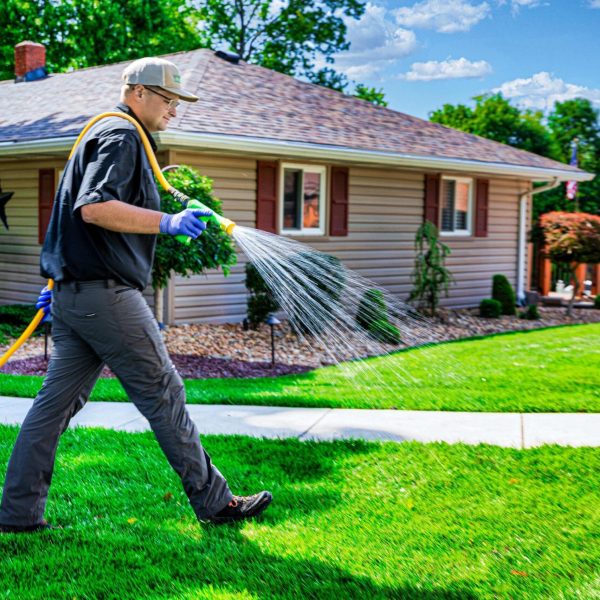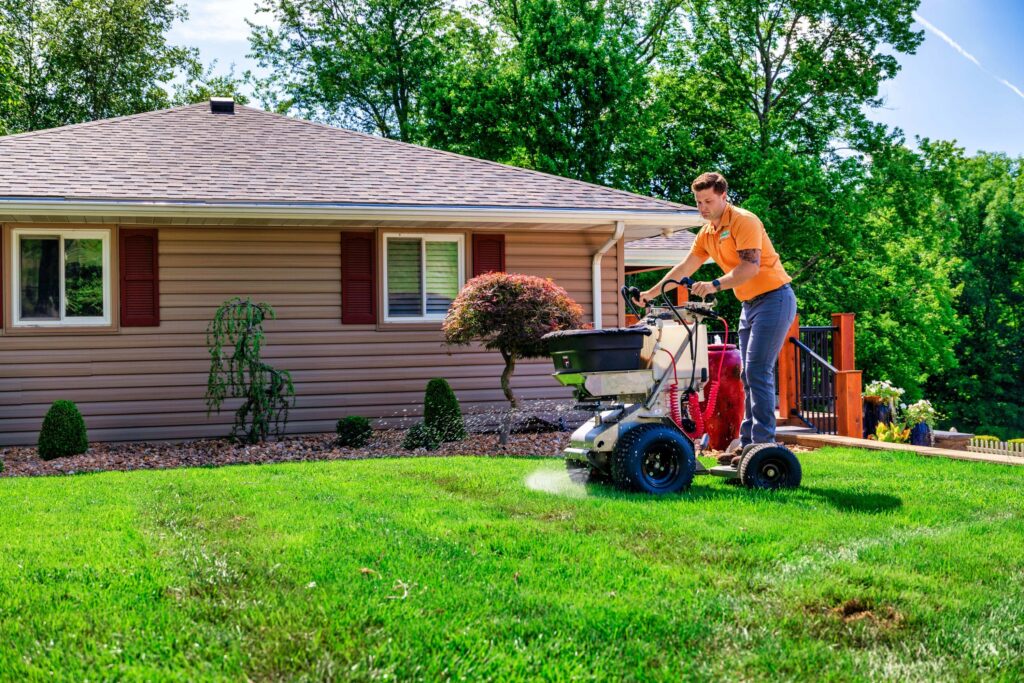Experience personalized, professional lawn fertilization and weed control from a family-owned company that understands Ohio Valley growing conditions.

Transform your yard into a lush, green oasis with our expert lawn care services, tailored to keep your lawn healthy and weed-free year-round.

Lawn fertilization and weed control are essential for maintaining a thick, healthy lawn in the Ohio Valley. At Bradley Lawn-Scape, we use proven fertilization schedules and targeted weed control strategies designed specifically for grass types common in Steubenville, Imperial, and surrounding areas.
Our balanced fertilizer applications promote strong root development, improve drought resistance, and enhance overall turf health from early spring through late fall. When combined with proactive weed control, this approach prevents invasive weeds from competing for nutrients, water, and space — resulting in a cleaner, greener lawn throughout the season.
Effective weed control in the Ohio Valley requires a proactive, season-by-season approach. At Bradley Lawn-Scape, we focus on preventing weeds before they start and eliminating existing growth with targeted, professional treatments. Early-season pre-emergent applications help stop weed seeds from germinating, while post-emergent treatments address visible weeds such as dandelions, crabgrass, and other invasive species common to the Steubenville and Imperial area.
Our weed control programs work hand-in-hand with proper lawn fertilization to strengthen turf, promote dense growth, and naturally crowd out unwanted weeds. Combined with sound mowing and watering practices, this comprehensive approach results in a thicker, healthier lawn with long-lasting curb appeal. With consistent care and expert applications, homeowners can enjoy a vibrant lawn without the frustration and guesswork of weed management.
A professional pre-emergent application prevents crabgrass and other annual weeds before they germinate. A balanced early-season fertilizer promotes strong spring green-up and establishes a healthy foundation for the growing season.
A full-coverage liquid treatment targets dandelions, clover, and common broadleaf weeds while supporting even, consistent turf growth. This step cleans up early-season weeds and strengthens grass density.
Preventative grub and surface insect control protects roots and turf during peak summer stress. A slow-release fertilizer maintains color and vigor, while spot treatments address problem weeds like nutsedge and spurge.
Targeted applications focus on stubborn weeds such as wild violet and ground ivy while maintaining turf health during late-season conditions. Fertilization helps grass stay strong and resilient.
A final fall feeding strengthens root systems and improves spring green-up. Late-season weed control reduces overwintering weeds, giving your lawn a cleaner, healthier start next year.
A healthy lawn requires more than occasional treatments — it takes a consistent, well-planned approach tailored to your property and local growing conditions. Bradley Lawn-Scape provides professional lawn fertilization and weed control services for residential and commercial properties throughout Steubenville, OH and Imperial, PA.
Our lawn treatment programs are designed to promote thick, green turf while preventing and eliminating common Ohio Valley weeds like dandelions, crabgrass, and clover. By combining targeted weed control with proper fertilization, we help your lawn grow stronger, resist stress, and maintain long-lasting curb appeal.
Whether you’re maintaining a home lawn or managing a commercial property, our team delivers dependable service, clear communication, and results you can see season after season.
No two lawns are the same. We evaluate your turf, soil conditions, and seasonal challenges to create a fertilization and weed control plan that’s tailored to your specific property. This customized approach delivers stronger roots, healthier grass, and better long-term results.
Our lawn treatment programs are built on proven agronomic practices and products designed for Ohio Valley conditions. By applying the right nutrients and treatments at the right time, we promote consistent growth, reduce weed pressure, and improve overall lawn health throughout the season.
From clear communication to dependable scheduling, our team delivers professional service you can count on. We show up on time, apply treatments safely and accurately, and treat your property with the care and respect it deserves — every visit, every season.
Bradley Lawn-Scape has been helping homeowners and businesses maintain healthy, great-looking lawns for decades. Our reputation is built on consistent results, honest recommendations, and professional service you can count on season after season.
From fertilization and weed control to complete lawn treatment programs, we take pride in doing the job right — and treating every property like it’s our own.
